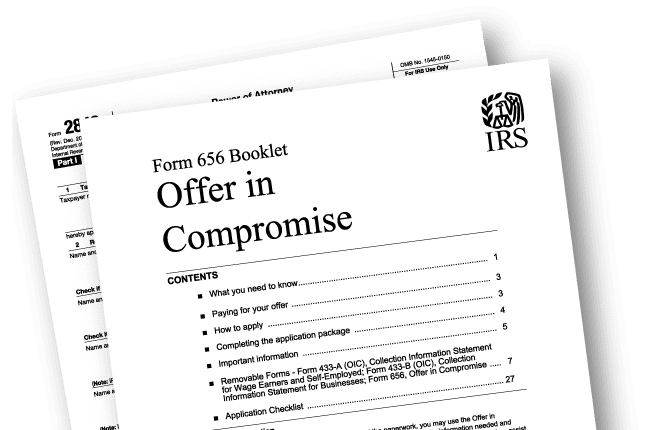
What is an Offer in Compromise?
The Offer in Compromise (or OIC) program, in the United States, is an Internal Revenue Service (IRS) program which allows qualified individuals with an unpaid tax debt to negotiate a settled amount that is less than the total owed to clear the debt.
Dealing with the IRS is difficult and sometimes an Offer In Compromise is something you may have to deal with.
What can it do for me?
Taxpayers who can fully pay the liabilities through an installment agreement or other means, generally won’t qualify for an OIC in most cases. To qualify for an Offer In Compromise, the you must have filed all tax returns, made all required estimated tax payments for the current year, and made all required federal tax deposits for the current quarter if the taxpayer is a business owner with employees.


Will I be accepted?
In most cases, the IRS won’t accept an Offer In Compromise unless the amount offered by a taxpayer is equal to or greater than the reasonable collection potential (RCP). The RCP is how the IRS measures the taxpayer’s ability to pay. The RCP includes the value that can be realized from the taxpayer’s assets, such as real property, automobiles, bank accounts, and other property. In addition to property, the RCP also includes anticipated future income less certain amounts allowed for basic living expenses. These are key features that must be carefully reviewed with a professional tax preparer.
Reasons for Accepting the Offer In Compromise
The IRS may accept an Offer In Compromise based on three grounds:
First, the IRS can accept a compromise if there’s doubt as to liability. A compromise meets this only when there’s a genuine dispute as to the existence or amount of the correct tax debt under the law.
Second, the IRS can accept a compromise if there’s doubt that the amount owed is fully collectible. Doubt as to collectability exists in any case where the taxpayer’s assets and income are less than the full amount of the tax liability.
Third, the IRS can accept a compromise based on effective tax administration. An offer may be accepted based on effective tax administration when there’s no doubt that the tax is legally owed and that the full amount owed can be collected, but requiring payment in full would either create an economic hardship or would be unfair and inequitable because of exceptional circumstances.
